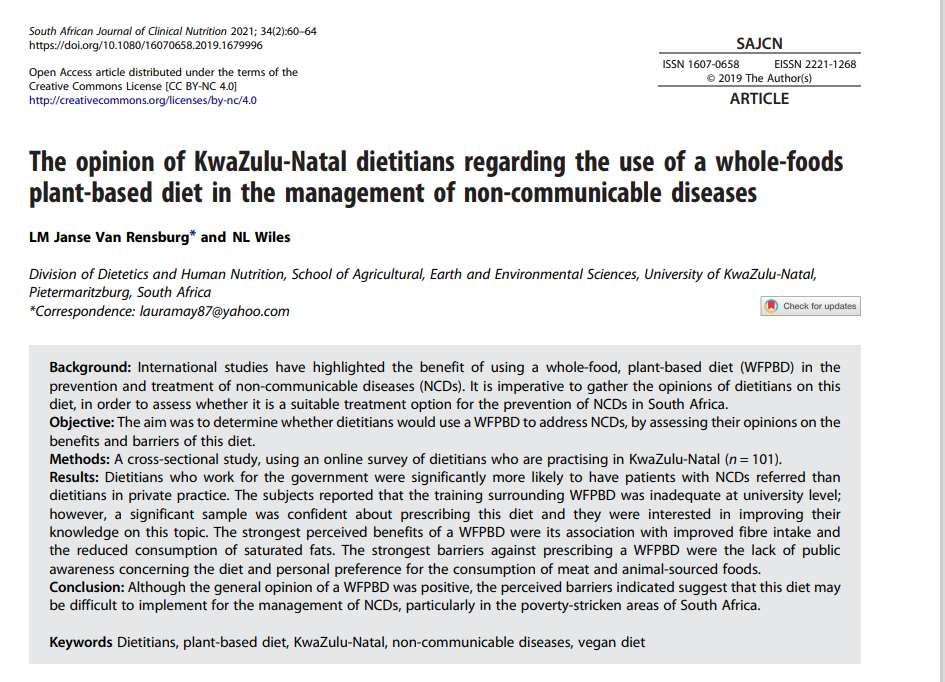The Ultimate Guide to Dietitians South Africa Promoting WFPB Diet

This guide goes into depth about dietitians in South Africa as they promote the WFPD diet.
We’ll walk you through the impact that dietitians in South Africa have. They advocate for a whole food plant-based (WFPB) diet.
Now
Dietitians are crucial in South Africa.
They promote health and wellness with personalised nutrition plans and evidence-based dietary advice.
They focus on improving people’s well-being. They are at the forefront of promoting healthy eating and lifestyle choices.
But wait…
Before we get side-tracked, let’s dive in.
The Rise of Eating Plant-Based in South Africa
There has been a growing trend in South Africa’s use of plant-based diets.
Dietitians are leading the way in educating the public about the benefits.
They teach people to eat more fruits, vegetables, and whole grains.
They emphasise balanced nutrition.
It helps people make informed diet choices and supports their health.
WFPB Advocates
Many dietitians in South Africa strongly advocate a whole food plant-based diet.
Dietitians in South Africa are experts and dedicated.
They are vital in promoting healthy eating and advocating for access to nutritious food for all.
(Visit one, and you will not break the bank…)
They commit to spreading nutrition knowledge. This knowledge shows their crucial role. They shape a healthier future for communities across the country.
Are there any benefits to opting for the WFPB diet?
The Benefits of Whole Food Plant-Based Diets on Health and Environmental Impacts
We are discussing dietitians in South Africa who promote the WFPB diet, and it’s crucial to understand.
Whole food plant-based diets have become popular. And for good reason.
Not only do they offer many health benefits, but they also positively impact the environment.
Whole Food Plan-Based Diet Benefits
WFPB is a diet centred on eating minimally processed plant foods.
These include fruits and vegetables. And also whole grains, nuts, seeds, and legumes.
By focusing on these foods, you can experience various health benefits.
Plant-Based Nutrition
One critical advantage of a whole food plant-based diet is that it can improve health.
Research has shown that this diet can help lower the risk of chronic diseases. These include heart disease, diabetes, and some cancers.
Also, people who eat a plant-based diet tend to have lower cholesterol and blood pressure.
Sustainable Eating Habits
Besides the health benefits, a plant-based whole foods diet can help the environment.
Plant-based diets need fewer resources, such as water and land, than animal-based diets.
By eating sustainably, individuals can reduce their carbon footprint.
They can also promote environmental conservation.
But
Are dietitians in South Africa embracing the WFPB diet?
Why Dietitians in South Africa Are Embracing and Promoting WFPB: Insights from Experts
Dietitian’s Perspective On WFPB Diet
In 2021, L M Janse van Rensburg and N L Wiles conducted a study. It looked at the opinion of KZN dietitians on using the WFPB diet.

Source: Research article/Janse van Rensburg and Niles
The results show a developing trend in WFPB for dietitians in South Africa.
What is happening?
Dietitians in South Africa are promoting WFPB diets.
Experts in the field have explained why this diet is gaining popularity, and nutrition professionals in the region are also seeing it.
Nutritional Recommendations In South Africa
From a dietitian’s view, WFPB diets match South Africa’s nutrition recommendations.
They emphasise consuming whole, minimally processed plant foods for optimal health.
Here’s the deal…
Does one go entirely into this diet without any planning?
Plant-Based Meal Planning
These experts advocate for a shift to more plant-based meal planning. This change will improve well-being and prevent common chronic diseases.
The emphasis is on adding many colourful foods to daily meals.
These include fruits, vegetables, legumes, whole grains, nuts, and seeds.
Dietitians support this, as they work to promote diets that support long-term health.
Dietitians encourage clients to adopt WFPB diets.
These diets are nutrient-dense.
Dietitians empower individuals to make informed choices. These choices benefit their health and the environment.
South African dietitians advocate for whole food plant-based diets.
They do this through personalised meal plans and educational resources.
They are vital in shaping healthier eating habits. They also promote sustainable food in their communities.
The growing acceptance of WFPB diets reflects a shift toward seeing plant-based nutrition as crucial to preventive healthcare.
This shift is happening across diverse populations.
Some dietitians, such as the Green Dietitian, are vocal about plant-based diets.
They show the dietitian’s perspective on WFPB and how they promote it in South Africa.
Success Stories: Real-Life Experiences in South Africa Thriving on WFPB With Dietitian’s Support
Starting a healthier lifestyle can be scary.
However, with proper support, people in South Africa can thrive on the Whole Food Plant-Based (WFPB) lifestyle.
They do this with the help of dedicated dietitians.
These success stories show the power of personalised nutrition plans and expert advice. They help achieve optimum health and well-being.
Healthy Living With A Dietitian Guidance
In South Africa, people have shared inspiring stories of their WFPB transformation journeys.
They show how they embraced healthy living with the invaluable help of dietitians.
They worked closely with these pros.
They also met their health goals and improved their quality of life.
WFPB Success Stories In South Africa
Tailored nutrition plans and ongoing guidance from dietitians have worked.
They have led to significant changes.
The changes affect the health and energy of people in South Africa, both physically and mentally.
These success stories testify to personalised dietary advice’s profound impact on one’s life.
This article aims to inspire others to prioritise their health and well-being.
We will do this by sharing real-life experiences.
These are from thriving individuals on WFPB with dietitian support.
With help and good choices, anyone can get the life-changing benefits of a healthy diet.
What about challenges you may encounter?
Challenges and Solutions: Overcoming Barriers to Adopting A WFPB Lifestyle With Professional Help
A reminder!
You’re not living on an island alone.
As a human being, you’re a social animal. You meet and socialise with people.
How do you navigate through this maze of a whole food plant-based diet?
Navigating Social Situations On A Plant-Based Diet
It can be hard to navigate social situations on a plant-based diet.
Cultural barriers block adopting a plant-based diet.
However, with professional help and guidance, individuals can overcome these challenges.
Overcoming Cultural Barriers to WFPB Adoption In South Africa

Pexels/Meruyert Gonullu
A key solution to overcoming barriers is seeking support from professionals.
This solution is valid for adopting a plant-based lifestyle.
Dietitians understand the nuances of transitioning to this way of eating.
Professionals such as nutritionists or dietitians can give personalised guidance.
They tailor it to individual needs and cultural backgrounds.
South African traditions and norms may make embracing a whole-food, plant-based diet hard.
This challenge makes professional support even more crucial.
Can you imagine…
You are coming from KZN. You’re having dinner with your friend from Lenasia. A colleague from the Bo-Kaap in the Western Cape joins you.
Will there be a familiar cuisine?
How can you adopt a whole food plant-based diet in that situation?
Dietitians offer practical advice on meal planning, recipe changes, and effective communication.
These skills will help individuals navigate cultural barriers to adopt a plant-based diet confidently.
They do this by working with plant-based nutrition experts with
their expertise and support.
With them, transitioning to a plant-based diet can be a rewarding journey.
It leads to better health and well-being.
Conclusion
Yes…
There it is.
The ultimate guide to dietitians in South Africa to promote the WFPB diet.
Now, it’s your turn.
Will you choose whole food plant-based options over processed foods and animal products?
Do you have a diet option that benefits your health? It also helps the environment and animal welfare.
Will you give up these many health benefits?
They include weight control and better heart health.
They also mean less risk of chronic diseases like diabetes and cancer.
They mean improved digestion, more energy, and longer life.
Now
I’d like to hear from you.
Leave a comment below right now.
